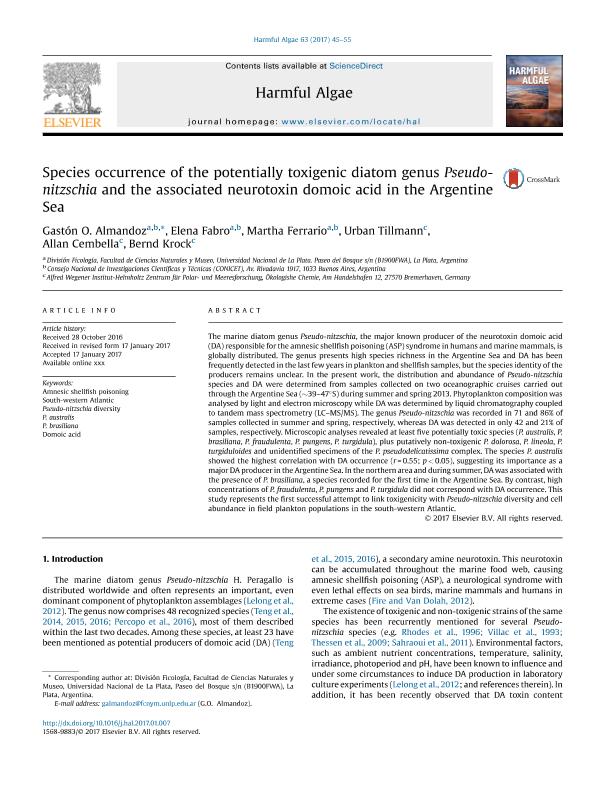Mostrar el registro sencillo del ítem
dc.contributor.author
Almandoz, Gaston Osvaldo

dc.contributor.author
Fabro Cerreia Fus, Elena Ines

dc.contributor.author
Ferrario, Martha Elba

dc.contributor.author
Tillmann, Urban
dc.contributor.author
Cembella, Allan
dc.contributor.author
Krock, Bernd
dc.date.available
2018-06-21T16:46:22Z
dc.date.issued
2017-03
dc.identifier.citation
Almandoz, Gaston Osvaldo; Fabro Cerreia Fus, Elena Ines; Ferrario, Martha Elba; Tillmann, Urban; Cembella, Allan; et al.; Species occurrence of the potentially toxigenic diatom genus Pseudo-nitzschia and the associated neurotoxin domoic acid in the Argentine Sea; Elsevier Science; Harmful Algae; 63; 3-2017; 45-55
dc.identifier.issn
1568-9883
dc.identifier.uri
http://hdl.handle.net/11336/49559
dc.description.abstract
The marine diatom genus Pseudo-nitzschia, the major known producer of the neurotoxin domoic acid (DA) responsible for the amnesic shellfish poisoning (ASP) syndrome in humans and marine mammals, is globally distributed. The genus presents high species richness in the Argentine Sea and DA has been frequently detected in the last few years in plankton and shellfish samples, but the species identity of the producers remains unclear. In the present work, the distribution and abundance of Pseudo-nitzschia species and DA were determined from samples collected on two oceanographic cruises carried out through the Argentine Sea (∼39–47°S) during summer and spring 2013. Phytoplankton composition was analysed by light and electron microscopy while DA was determined by liquid chromatography coupled to tandem mass spectrometry (LC–MS/MS). The genus Pseudo-nitzschia was recorded in 71 and 86% of samples collected in summer and spring, respectively, whereas DA was detected in only 42 and 21% of samples, respectively. Microscopic analyses revealed at least five potentially toxic species (P. australis, P. brasiliana, P. fraudulenta, P. pungens, P. turgidula), plus putatively non-toxigenic P. dolorosa, P. lineola, P. turgiduloides and unidentified specimens of the P. pseudodelicatissima complex. The species P. australis showed the highest correlation with DA occurrence (r = 0.55; p < 0.05), suggesting its importance as a major DA producer in the Argentine Sea. In the northern area and during summer, DA was associated with the presence of P. brasiliana, a species recorded for the first time in the Argentine Sea. By contrast, high concentrations of P. fraudulenta, P. pungens and P. turgidula did not correspond with DA occurrence. This study represents the first successful attempt to link toxigenicity with Pseudo-nitzschia diversity and cell abundance in field plankton populations in the south-western Atlantic.
dc.format
application/pdf
dc.language.iso
eng
dc.publisher
Elsevier Science

dc.rights
info:eu-repo/semantics/openAccess
dc.rights.uri
https://creativecommons.org/licenses/by-nc-sa/2.5/ar/
dc.subject
Amnesic Shellfish Poisoning
dc.subject
Domoic Acid
dc.subject
P. Australis
dc.subject
P. Brasiliana
dc.subject
Pseudo-Nitzschia Diversity
dc.subject
South-Western Atlantic
dc.subject.classification
Otras Ciencias Biológicas

dc.subject.classification
Ciencias Biológicas

dc.subject.classification
CIENCIAS NATURALES Y EXACTAS

dc.title
Species occurrence of the potentially toxigenic diatom genus Pseudo-nitzschia and the associated neurotoxin domoic acid in the Argentine Sea
dc.type
info:eu-repo/semantics/article
dc.type
info:ar-repo/semantics/artículo
dc.type
info:eu-repo/semantics/publishedVersion
dc.date.updated
2018-06-21T12:58:22Z
dc.journal.volume
63
dc.journal.pagination
45-55
dc.journal.pais
Países Bajos

dc.journal.ciudad
Amsterdam
dc.description.fil
Fil: Almandoz, Gaston Osvaldo. Consejo Nacional de Investigaciones Científicas y Técnicas; Argentina. Universidad Nacional de La Plata. Facultad de Ciencias Naturales y Museo. División Ficología; Argentina
dc.description.fil
Fil: Fabro Cerreia Fus, Elena Ines. Consejo Nacional de Investigaciones Científicas y Técnicas; Argentina. Universidad Nacional de La Plata. Facultad de Ciencias Naturales y Museo. División Ficología; Argentina
dc.description.fil
Fil: Ferrario, Martha Elba. Consejo Nacional de Investigaciones Científicas y Técnicas; Argentina. Universidad Nacional de La Plata. Facultad de Ciencias Naturales y Museo. División Ficología; Argentina
dc.description.fil
Fil: Tillmann, Urban. Alfred Wegener Institut; Alemania
dc.description.fil
Fil: Cembella, Allan. Alfred Wegener Institut; Alemania
dc.description.fil
Fil: Krock, Bernd. Alfred Wegener Institut; Alemania
dc.journal.title
Harmful Algae

dc.relation.alternativeid
info:eu-repo/semantics/altIdentifier/doi/https://dx.doi.org/10.1016/j.hal.2017.01.007
dc.relation.alternativeid
info:eu-repo/semantics/altIdentifier/url/https://www.sciencedirect.com/science/article/pii/S156898831630316X
Archivos asociados
